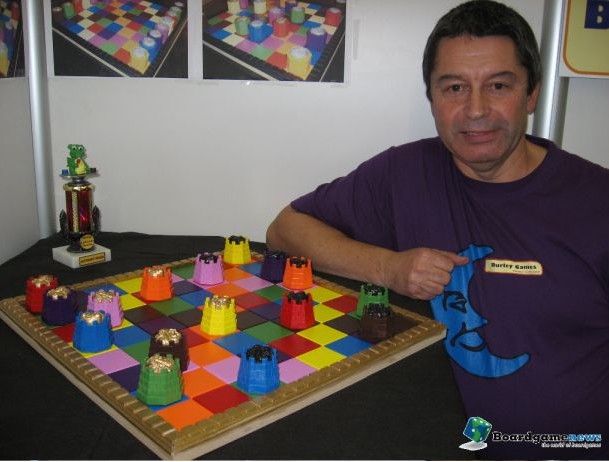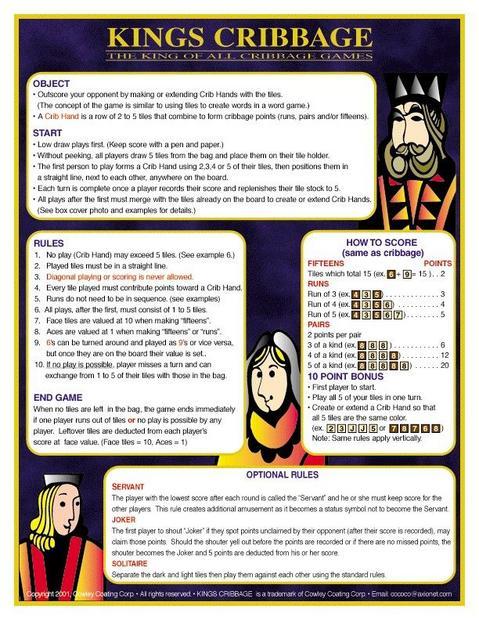
Two talented individuals an ocean apart talk about their respective contributions to keeping us amused: King’s Cribbage, Kamisado, and a lot more.

The 15th Mind Sports Olympiad has just been held in Central London. While MSO hosts many older and classical games, including chess and backgammon tournaments, from its inception in 1997 it has also featured new games. Two newbies featured this year were King’s Cribbage and Kamisado.
King’s Cribbage is manufactured by Canadian entrepreneur Roy Cowley, the son of its inventor; Kamisado is the brainchild of Englishman and dedicated games inventor Pete Burley.
We caught up with Pete at MSO 15 and with Roy in cyber-space where they shared their thoughts and visions for the future.
The origins of most card games are lost to antiquity, and many have evolved, like folk songs. The game of cribbage has a definite inventor, the original 5 card version was the brainchild of the Cavalier Sir John Suckling (1609-42), a fine legacy of his short life.
Scrabble was invented during the Great Depression by an unemployed American architect.
Put the two together via Canada, and you have a three-cornered special relationship.
The game King’s Cribbage is a combination of the two, played on a scrabble layout with scrabble pieces but with card denominations instead of letters. An original concept, it has actually been around for over a decade, though this is the first year it has appeared at MSO.

Roy Cowley
AB: Who actually invented King’s Cribbage?
RC: The concept behind Kings Cribbage was thought up by my father, Gary Cowley. [Who is away at the moment]. He enlisted myself and my brother-in-law to help turn the concept into a real product.
AB: When and where? What inspired it?
RC: My Dad came up with the concept while on a long boring flight from Vancouver to the Philippines. Kings Cribbage was inspired by the card game Cribbage, and crossword puzzles.
AB: Did you have any problems patenting it?
RC: The game is trademarked, and copyrighted. Since it’s based on other classic games that have been played for generations, patents are not possible. Originally we promoted the game by attending various trade shows, and selling it ourselves in local shopping malls. Nowadays we have Paul Turner promoting the game in the UK, a website offering free online play, but word-of-mouth has really been the main driving force.
We have developed several other games: Bushopoly, LOSER!, Criblets, Hockey Trivia, to name a few. Some were just concepts that never got published (Bushopoly), and others went on to achieve decent sales numbers. However, Kings Cribbage has been our most popular game by far.
AB: What is your involvement if any with the Mind Sports Olympiad?
RC: The Mind Sports Olympiad/Kings Cribbage connection was done through Paul Turner, our UK representative.
AB: What do you think Sir John Suckling would have made of the game?
RC: I hope Sir John Suckling would like the game, but who knows! Cribbage has enjoyed probably hundreds of variations, which seems to be accepted by the cribbage community. Unlike other games, which are considered sacred (like chess, backgammon), where you never mess with the rules and format. Cribbage lends itself nicely to the variations, so I’m sure he would at least be proud of what cribbage has become.
AB: Why should people buy your game when they can play it free on the Internet?
RC: Free Internet play is fun when you have nobody around to play with. It allows you to enjoy a game anytime, day or night. However, the best way to play King’s Cribbage is still against friends and family, on a table, at the cottage, etc. This is both more fun and more relaxing, and allows friendly rivalries to develop. Also, board games make a great gift, online versions not so much!
Pete Burley
AB: Before we talk about Kamisado and other games, can you tell me a few things about yourself, like your background, are you a mathematician, artist, or do you have some connection with games?
PB: My background is that, after obtaining a Mathematics degree at Bath University, I pursued a varied career in the IT industry, right up until May of this year, when I was made redundant from my ‘day job’. In parallel with this IT career, I have run my own games company since 2003. I am at a crossroads at the moment, deciding whether to find another IT job or go full time with the games. I would prefer to do the latter, but it depends on whether I can earn enough from the games alone to support my family.
AB: How many games have you invented?
PB: I haven’t made a list but I would guess that I have invented between 30 and 40 games. So far, the following five have been published:
Take it Easy (J.W.Spear, F.X.Schmid, Ravensburger, Burley Games)
Kamisado (Burley Games, Huch & Friends, Zvezda)
Treasure Island (Burley Games)
Take it to the Limit (Burley Games)
Take it Higher (Burley Games) – co-authored with Reiner Knizia.
AB: What is your most successful game financial or otherwise?
PB: My most successful game in terms of numbers sold is Take it Easy. This has sold in excess of a million copies (mainly via Ravensburger).
From the financial angle, Kamisado will probably end up being the most successful. This is because I pay for their manufacture and then sell them to the distributors (as opposed to having a royalty agreement as with Ravensburger). I have sold nearly 30,000 units through Huch & Friends since the beginning of 2010.
AB: When did you first play the Mind Sports?
PB: I attended Mind Sports for the first time last year. I didn’t enter for any of the games, but I ran an ‘unofficial’ Kamisado tournament to get people interested in playing. I have played in several events this year, including Kamisado, which has now been accepted as an official event.
AB: Have any of your other games been used by MSO or other gaming events?
PB: My games had not been used at MSO prior to this year. Take it Easy has been used at many other events (including at Essen Spiel), taking advantage of the fact that any number of players can play simultaneously. I have seen tournaments at Essen where about 140 people were all playing at once.
AB: What inspired Kamisado?
PB: The inspiration for Kamisado is neither grand nor poetic. It originated from my seeing a tiled floor in a gents’ toilet in Wormholt Park, Shepherds Bush. This is fully explained within the Wikipedia entry for Kamisado (and a pod-cast interview I did for a German website called Cliquenabend).
AB: Kamisado won a national prize in 2009; have you won any other prizes for your creations?
PB: Awards received for my games are as follows:
Take It Easy:
1994 – Spiel des Jahres Nominee
2005 – NATLL Good Toy Guide Silver Award for Board Games
2007 – Family Game of the Year (Norway) Nominee
2008 – UK Games Expo Award for Special Achievement
2009 – Teacher’s Pick by Scholastic’s Instructor Magazine Take it to the Limit:
2006 – NATLL Good Toy Guide Silver Award for Board Games
2008 – UK Games Expo Award for Special Achievement
Kamisado:
2009 – Winner, JoTa (Brazil) Two-Player Game Award
2009 – International Gamers Awards Finalist
2009 – Major Fun Awards – Thinking Game Award
2009 – Winner, UK Games Expo Best Abstract Game
2009 – Golden Geek Best Two-Player Board Game Nominee
2010 – Winner, II Mensa HungarIQa Boardgame Competition
2010 – German Learning Game Award Nominee
2010 – Spiel des Jahres Recommended List
AB: What were you doing at Kirkstall Abbey?
PB: A friend of mine called Nigel Scarfe (who runs a games company called Imagination Gaming) has been attending a series of events called Breeze on Tour which is held in the Leeds area during the school holidays. At these, he has been running a series of Take it Easy tournaments for schoolchildren. On Wednesday, the Grand Final (involving all the kids that had achieved the highest scores in their local events) was held in the field next to Kirkstall Abbey, and Nigel had invited me to attend and present the prizes to the winners.
AB: Do you do a lot of exhibitions, etc?
PB: I attend Essen Spiel every year (since 2004), and I have attended UK Games Expo since the inaugural year (although I missed this year’s to attend an event in Germany called Spiel und Autor). I plan to attend MSO every year from now on, and also the MENSA Games Finals weekend in October. I attend a number of other smaller shows, but up till now the ‘day job’ has prevented me from having enough time to go to as many as I would like. My first priority is to start attending the Nuremberg Toy Fair every year, as it would appear that this is where I must go to make my business really successful.
AB: Do you sell your games on-line? I can’t find a sales page.
PB: No. Once again, up until now the day job did not permit me the time to be able to process the orders and get the games posted out. I do sell an odd Take it Easy or Treasure Island from time to time, but this is only because people occasionally find their way to the sales pages on my ‘old’ website www.burleygames.co.uk.
AB: Why should anyone buy Kamisado or any of your games when they can play them on-line?
PB: I believe that many people (myself included) value the experience of being able to play games face-to-face with their friends and families. While it is nice to be able to play online (enabling games to be played with people all round the world) there is no real substitute for being able to sit around a board together, making the game a social experience rather than simply an intellectual contest. Also, part of the charm of gaming is to own, and play with, beautiful boards and tactile playing pieces.
It was significant that when there was all the litigation concerning Scrabulous (with a dispute taking place between its creators in India and Hasbro and Mattel), it transpired that the existence of Scrabulous had actually raised the awareness of Scrabble to the extent that sales of the board game (for Hasbro and Mattel) had significantly increased. This would tend to indicate that online versions of games can help to promote the equivalent board games, as opposed to killing off their sales potential.
[The above article was first published August 30, 2011.]
Back To Digital Journal Index